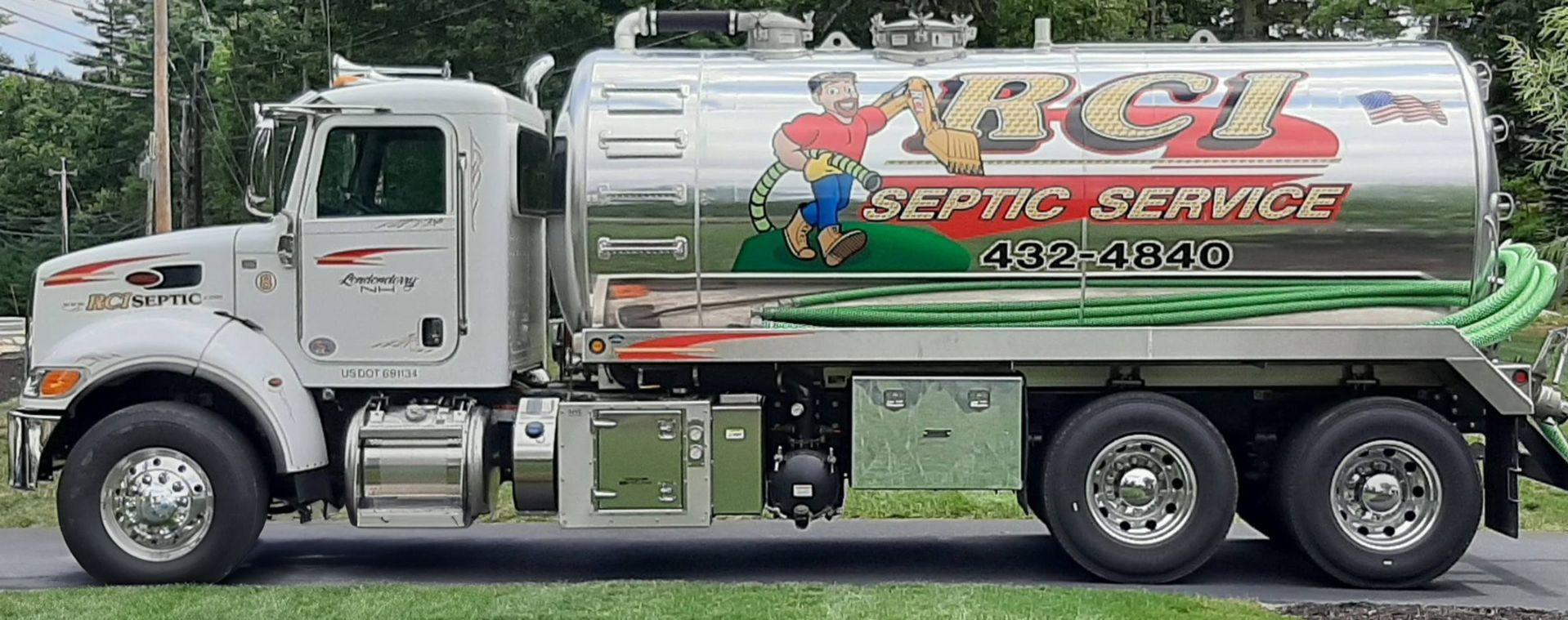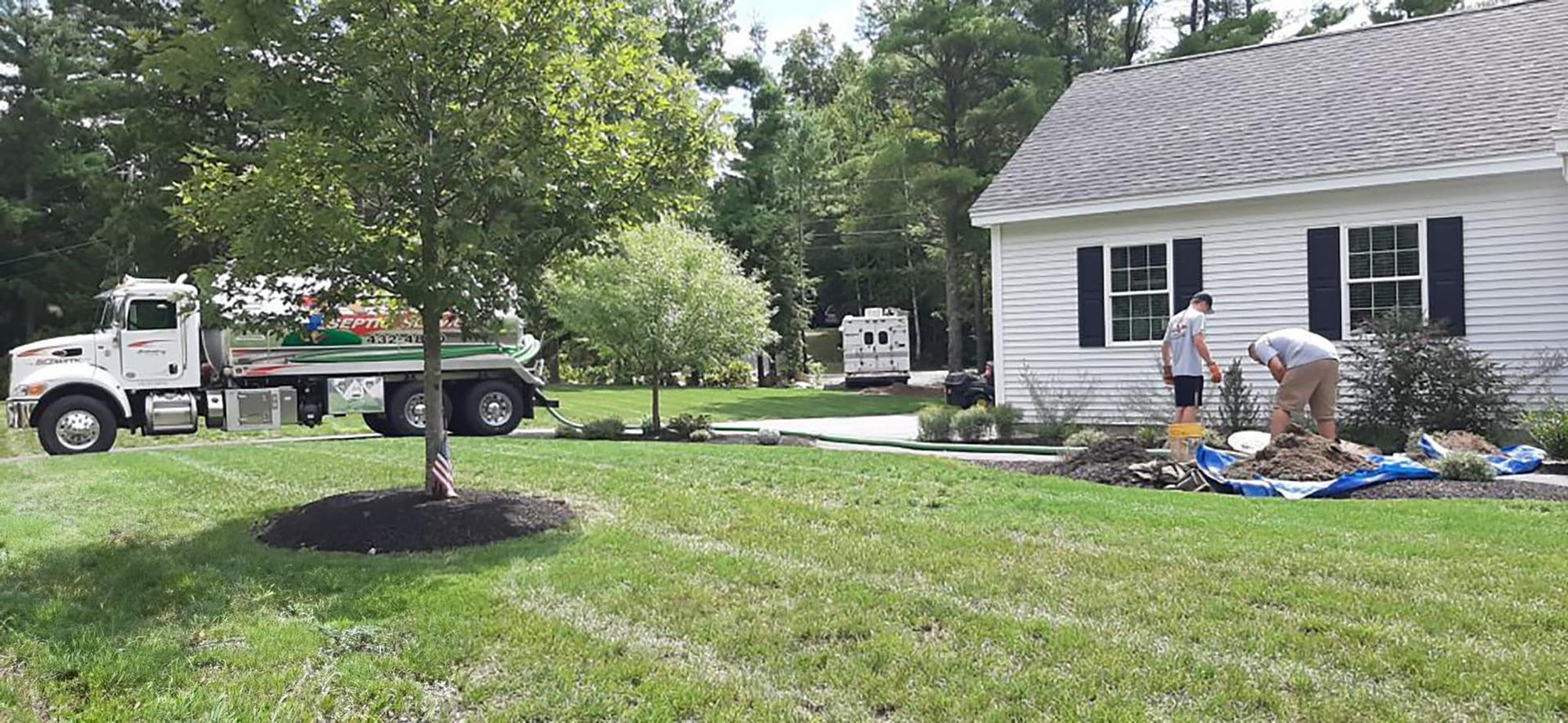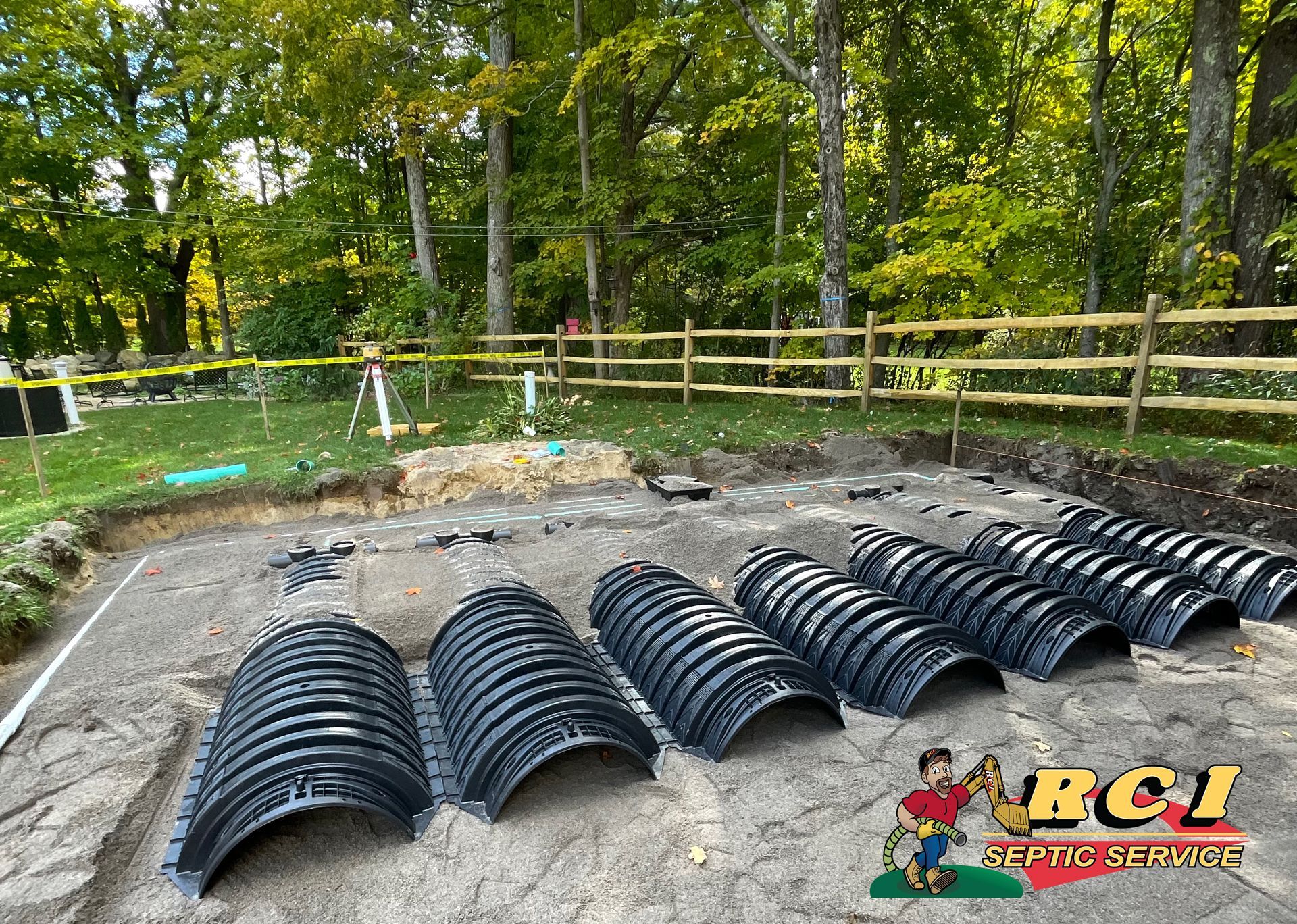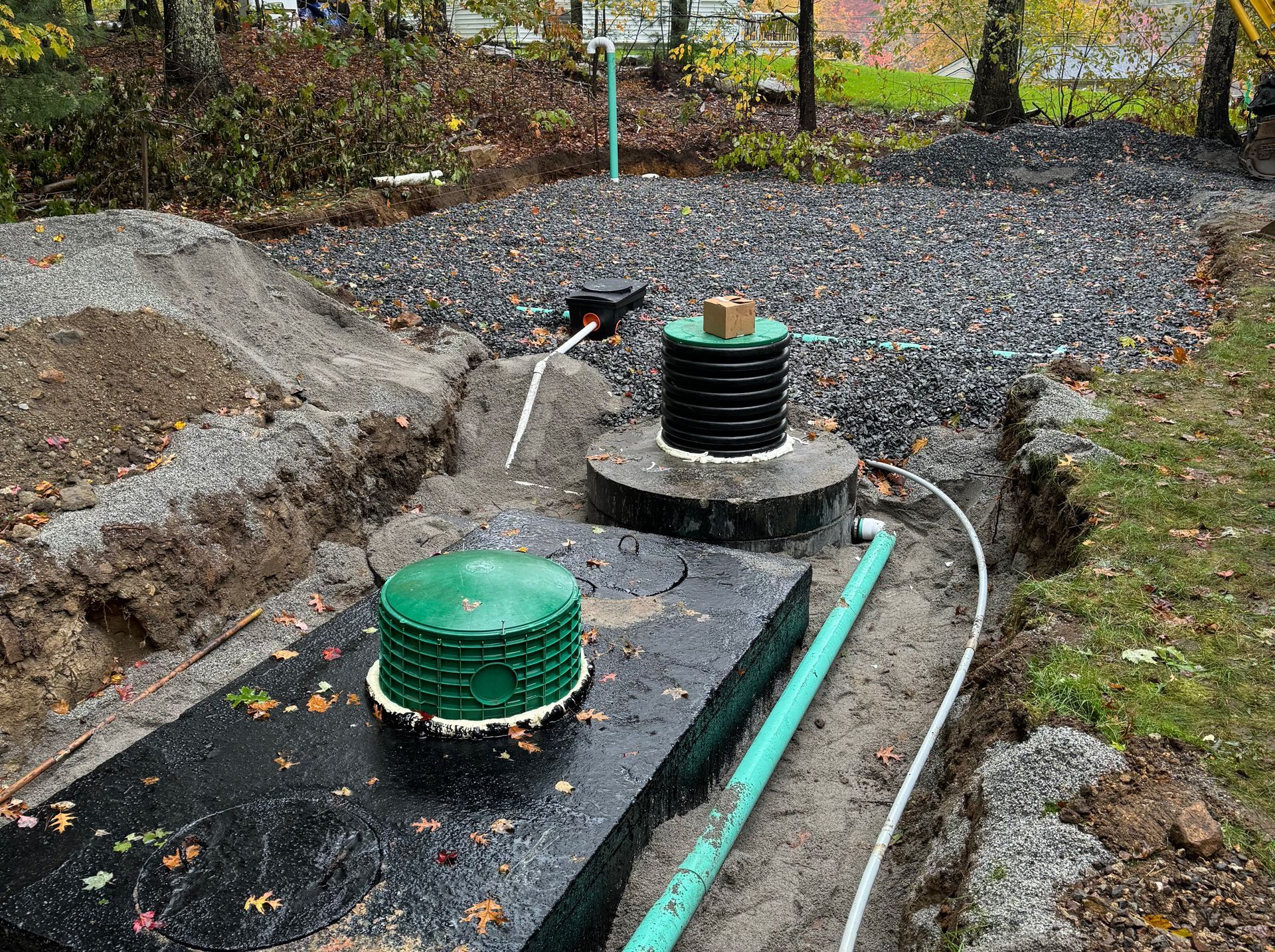Septic Tank Pumps: Essential Insights for Homeowners
How often should you pump your septic tank? Regular septic tank pump maintenance is key to avoiding system failures and costly repairs. In this guide, we’ll cover how frequently to pump, signs it’s time for maintenance, and essential tips to keep your system running smoothly.
Takeaways
- Pumping and maintenance of septic tanks are crucial to prevent system failure, the environment, and regulations.
- How often to pump septic tanks depends on household size, water usage, and tank size.
- Professional septic tank pumping services will do the maintenance, fix common issues and give you tailored advice for optimal system performance, so you won’t have to repair or replace the system.
Introduction
A septic tank buried in your yard is the first stop for all the waste from your home, including the output from your garbage disposal. Here, bacteria will break down organic matter; liquids will be filtered and released back into the environment through a drain field. It’s a self-contained wastewater treatment system that’s efficient and environmentally friendly when maintained properly. But like any system, including septic tanks and garbage disposals, it needs regular care to prevent backups, clogs, and environmental contamination.
Knowing your septic tank pumps and maintenance is key. Pumping regularly will make the system work properly, keep your property and the environment around it free from untreated sewage. Remember a well maintained septic tank is a responsible homeowner who takes care of their investment and the environment.
Importance of Septic Tank Pumps
The heart of your septic system, the septic tank pump, is more than just a component; it’s the force that ensures waste is properly processed and disposed of. Regular septic tank pumping is the key to preventing system malfunctions and avoiding the accumulation of solids that can lead to backups and clogs. Picture this: a septic system running smoothly, free from the threat of overflowing waste or sewage seeping into your pristine garden or, worse, your home.
However, the importance of septic tank maintenance extends beyond the confines of your property. By containing harmful substances within the tank, a well-maintained septic system prevents environmental contamination and protects groundwater and nearby rivers and streams from pollution. Additionally, staying compliant with septic pumping regulations is not just a matter of civic responsibility; it’s essential to avoid potential fines and ensure your septic system remains in top working order.

How Often Should You Pump Your Septic Tank?
How often should you schedule the unglamorous yet crucial task of septic tank pumping? General guidelines recommend a thorough pump every 1-3 years, but this is not a one-size-fits-all answer. It’s akin to a medical check-up for your septic system, and just like humans, each system has unique needs. If you’ve hit the three-year mark since the last cleaning, it’s likely time for a service visit.
The frequency of septic tank maintenance can vary based on several factors, such as household size, the volume of wastewater generated, and the size of the tank itself. The Environmental Protection Agency (EPA) echoes the three to five-year suggestion, but remember, this is not a rigid timeframe. Some homeowners may find that their tanks need attention more or less frequently, and it’s the actual tank levels that dictate when to pump, not the calendar. Consulting a septic tank pump chart is a useful tool to help determine the correct service interval for your home’s needs.
At RCI Septic we recommend households with 1-2 occupants should pump out their septic tank every 3 years. Households with 3-4 occupants should pump out their septic system every 2 years. And households with 5 or more occupants should have a septic clean out every year.
Signs Your Septic Tank Needs Pumping
Ignoring the signs that your septic tank is pleading for attention can lead to a slew of undesirable consequences. System failures, unpleasant odors, and potential property damage are just the tip of the iceberg. How can you tell if your tank is full? Investigating the scum layer, as well as the sludge layer and scum and sludge levels within your tank, can reveal whether it’s time to call in the professionals. But there are more obvious, less hands-on signs to be aware of:
- Slow draining sinks, showers, or toilets
- Gurgling sounds coming from your plumbing
- Foul odors coming from your drains or yard
- Sewage backups or overflows
- Lush, green patches of grass near your septic tank or drain field
If you notice any of these signs, it’s important to take action and have your septic tank inspected and pumped if necessary.
Clear indicators that your septic tank requires urgent pumping include:
- Slow drains
- Foul odors
- Standing water in the yard
- Sewage backups into your home
- Gurgling sounds from your toilets and drains
- Alarms indicating incorrect water levels
These are the cries for help from a septic system that’s been pushed to its limits.

Factors Affecting Septic Tank Pumping Frequency
While the three to five-year guideline is a sound starting point, several factors can influence how often your septic tank needs to be pumped. Household size, water usage, and tank size are the primary variables that can either decrease or increase the frequency of necessary pumping.
Let’s delve into each of these factors to understand how they impact the maintenance schedule of your septic system.
Household Size
A bustling household with a large family generates a significant amount of household wastewater, leading to a faster filling septic tank. More people means more showers, more laundry, and more frequent flushing of toilets, all of which contribute to increased water usage and waste production. Consequently, larger households may find themselves scheduling more frequent septic tank pumpings to manage the added load.
On the flip side, smaller households with fewer occupants generally produce less wastewater, which can extend the intervals between septic tank maintenance visits. The relationship between household size and septic tank pumping is direct: the more people, the more frequent the need for service. It’s a simple yet critical consideration for any homeowner looking to maintain a healthy septic system.
Water Usage
Water is a precious resource, and in the context of your septic system, it’s a critical factor that dictates the health and longevity of your setup. Using too much water can disturb the sensitive biological processes in the septic tank. This can result in the need for more frequent pumpings. When the system is overloaded with water, the accumulation of solids in the tank can accelerate, overwhelming the system’s capacity to process waste effectively.
Consider this: a single day of intensive laundry can flood your drainage field, putting undue stress on your septic system. Efficient water usage, such as repairing leaks and running full loads in dishwashers and washing machines, not only conserves water but also helps to manage the flow into your septic tank. Being aware of how much water you use can help you avoid frequent septic tank pumping, allowing your system to work properly. This simple effort can make a big difference in maintaining your system.
Tank Size
The size of your septic tank is not just a matter of space—it’s a matter of capacity. Larger tanks can accommodate a greater volume of waste, potentially reducing the need for frequent pumping. However, smaller tanks fill up more quickly, especially in larger households, which may necessitate a more aggressive maintenance schedule. The capacity of your septic tank is a factor determined by the square footage of your home, the number of toilets, and the expected overall usage of the septic system.
When considering tank size, remember that a smaller tank doesn’t just mean more frequent pumping—it also requires a closer eye on maintenance to prevent overfilling and potential backups. Conversely, owners of larger tanks should not become complacent, as regular inspections and pumping are still necessary to ensure system health. Tank size should be a key consideration when planning your septic system maintenance strategy.

The Septic Tank Pumping Process
Pumping Your Septic Tank
Pumping your septic tank involves more than you might think. We complete a Service Order for every tank we pump and will leave you a copy. We recommend the following schedule for pumping your tank:
- 1-2 Occupants – Every 3 Years
- 3-4 Occupants – Every 2 Years
- 5+ Occupants – Every Year
If the cover is not already exposed or there is no riser, we will dig to access it for a fee. During the process, we pump the solids off the top and remove all sludge, back-flushing if necessary to ensure thorough cleaning. The service order will include the following details:
- Location and size of the tank
- Whether it is a pump system
- Presence of a filter, which we clean free of charge
- Condition of the septage (normal, all liquid, all solid)
- Whether there is liquid running back from the leach field
- Condition of the tank and baffles if visible
Payment is due at the time of service, and we make arrangements with the homeowner. We keep records of your tank's location and condition and will send a reminder postcard before your next scheduled pumping. We also offer installation and repair services for tanks and systems. All findings are reviewed with the homeowner, and any necessary repairs or replacements can be arranged.
The septic tank pumping process includes:
- Opening the heavy septic tank lids.
- Using a specialized truck with a vacuum system to remove solid waste.
- Agitating the contents to break up scum and sludge.
- Cleaning the tank walls to remove residual sludge.
- Conducting a thorough inspection to assess system health and identify issues.
- Securely closing the tank lids and reburying the tank.
Septic tank cleaning services often extend beyond pumping, including inspections of various system components such as inlet and outlet pipes, distribution boxes, and the drain field to ensure everything is functioning as it should. Typically, the entire operation takes about 30 to 60 minutes, providing homeowners with the assurance that their system is in top shape.
Professional Septic Tank Pumping Services
When it comes to septic tank maintenance, the expertise of certified professionals cannot be overstated. These trained technicians are well-versed in the design, installation, and maintenance of septic systems, ensuring that they adhere to all local regulations. By hiring a certified septic tank pumping company, you’re not just meeting requirements—you’re also guaranteeing that the service is performed safely, efficiently, and with valid licensing and insurance.
Professional cleaners take the worry out of septic system care by conducting repairs, such as replacing damaged pipes or fittings, as necessary to maintain the system’s integrity. To find a trustworthy service, one should seek referrals, check online reviews and local social media groups, and verify that the company is properly licensed and insured. With professional services, you’re not only preventing costly repairs and system failures, but you’re also ensuring the proper disposal of waste and wastewater in compliance with environmental standards.
Consulting with professionals also helps you determine the optimal pumping frequency for your system through regular inspections and tailored maintenance advice.
Common Septic Tank Pump Issues
Even with regular maintenance, septic tank pumps can encounter issues that hinder their performance. Common problems include:
- Float controls that become stuck or displaced, which can prevent the pump from operating correctly
- Electrical issues, such as faulty wiring or power supply problems, that can cause the pump to fail
- Clogging due to debris or grease accumulation, which can cause the pump to struggle to function and potentially lead to backups.
Addressing these issues often requires a professional touch. For instance, removing and cleaning a clogged pump is a challenging and messy task. Electrical issues, in particular, should be left to professionals to ensure safety and correct resolution. Moreover, the type of waste disposed of—like non-biodegradable items or excessive chemicals—can affect the frequency of septic tank pumping, as they can contribute to blockages.
Regular inspections and servicing can help identify and resolve these common pump issues before they escalate into major problems.

Maintaining Your Septic System Between Pumpings
Between professional septic tank pumpings, homeowners can adopt various practices to maintain system health and extend its operational life. Proper waste disposal, for example, is crucial; using biodegradable products ensures that the septic system can flow smoothly, as these items are easily broken down by microorganisms and bacteria. Additionally, managing water usage by fixing leaks and installing water-efficient fixtures can greatly reduce the strain on the septic system and delay the need for pumping.
To ensure the longevity of your septic system, consider the following tips:
- Run full loads in dishwashers and washing machines
- Spread out laundry loads throughout the week
- Use high-efficiency appliances
- Avoid parking vehicles over the drainfield
- Keep tree roots away from the system
Simple changes in household habits can significantly impact the health of your septic system between service appointments.
Why Choose RCI Septic Service?
When it comes to septic system maintenance, RCI Septic Service stands out as a premier provider. As a family-owned and operated business, RCI prides itself on delivering friendly and professional service. Their services include:
- Clean-out and pumping
- Septic system inspections
- Septic tank repairs and replacements
- Drain cleaning and unclogging
- Grease trap cleaning
Their reputation for fast, friendly, and affordable services is well-established throughout Southern New Hampshire.
Peace of mind is a guarantee with RCI. They ensure that homeowners’ septic systems remain functional and out of mind by providing the following services:
- Routine maintenance
- Emergency repair and replacement services with minimal disruption to daily life
- Eco-friendly septic system installations customized to meet the specific needs of each property
By choosing RCI Septic Service, homeowners are entrusting their septic system care to local experts committed to delivering top-notch service.
Summary
As we come to the end of our journey through the intricacies of septic tank maintenance, let’s reflect on the critical takeaways. Regular septic tank pumping is not just a recommendation; it’s a necessity for the longevity of your septic system and the safety of your environment. Remember, every three to five years is a guideline, but factors such as household size, water usage, and tank size can alter this frequency. Paying attention to signs like slow drains and foul odors can save you from more serious issues down the line.
Professional septic services, like those provided by RCI Septic Service, offer the expertise and peace of mind necessary to ensure that your septic system is not just functional but thriving. By choosing professionals, you’re opting for safety, compliance with regulations, and the assurance that your system is in capable hands. So, take the step today to maintain your septic system regularly, and trust in the specialists to keep your system operating smoothly for years to come.
Frequently Asked Questions
How do I know when my septic tank needs to be pumped?
If you notice slow drains, foul odors, sewage backups, lush grass near the drain field, gurgling sounds from plumbing, or water pooling in your yard, your septic tank may need pumping. It's also recommended to have an inspection if it has been more than three to five years since the last pump.
Can I pump my septic tank myself?
No, it's best to hire certified professionals for septic tank pumping to ensure safety, prevent system damage, and comply with local regulations.
Does household size affect septic tank pumping frequency?
Yes, household size does affect septic tank pumping frequency. Larger households generate more wastewater and solids, requiring more frequent maintenance compared to smaller households.
Are there ways to maintain my septic system between pumpings?
Yes, by practicing efficient water usage, proper waste disposal, routine maintenance, and avoiding strain on the drain field, you can maintain the health of your septic system between pumpings. These efforts can extend the lifespan of your septic system.
Why should I choose RCI Septic Service for my septic system needs?
You should choose RCI Septic Service for your septic system needs because they are a trusted, family-owned business known for their friendly and professional service, offering a wide range of septic services and expertise to ensure your system functions properly.


